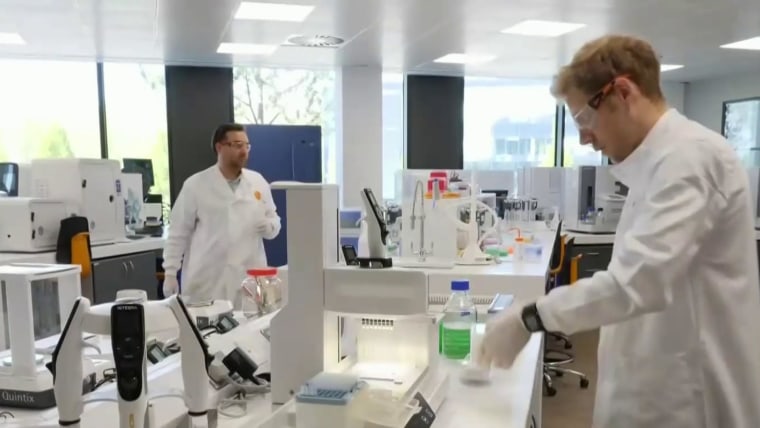Two potential coronavirus vaccines have shown promising results in early trials, and while experts say it's encouraging news, they warn that some of the biggest hurdles still lie ahead.
The early trial results for the two vaccine candidates — one developed by the University of Oxford and AstraZeneca and the other by the Chinese company CanSino Biologics — showed that both were safe and could induce immune responses in participants. But the next phase will be critical to demonstrate that the potential vaccines can protect against infections.
"If we're making a plane, right now we're at the production level," said Dr. Carlos del Rio, executive associate dean of the Emory University School of Medicine in Atlanta. "We can say it looks like this can at least get off the ground and do so safely. But can it get me from here to Paris? That's the question now."
So far, vaccine development efforts have proceeded at an exceptional pace. Typically, it takes roughly a decade for a new vaccine to go through the various stages of development and testing. But the urgency of the pandemic, which has killed more than 600,000 people worldwide, means that there are already two dozen vaccine candidates in clinical trials around the world.
For the Oxford-AstraZeneca and CanSino vaccine candidates, the next step in testing is known as phase three of human clinical trials. It's in this stage that scientists will be able to see whether a potential vaccine truly works to prevent coronavirus infections. While it's not common for vaccine candidates that have delivered good results in early stages to fail in subsequent phases, it can happen, del Rio said.
"I can tell you that in the world of HIV, we've seen a ton of vaccines be immunogenic — they produce immune responses — and then you take them to phase three and they don't protect you," he said.
Still, the results have been positive so far, del Rio said.
The newly released clinical trial results showed that the Oxford-AstraZeneca vaccine candidate triggered the production of both antibodies and T cells, which can recognize and attack virus cells. The multipronged immune response may be key, because researchers are still trying to figure out whether one is more important than the other in providing long-term protection.
"The immune system has different weapons, and normally we would spend maybe several years figuring out if the vaccine needs to be very good at inducing antibodies or if it needs to be good at inducing T cells or if you need a combination," said Paula Cannon, an associate professor of microbiology at the University of Southern California's Keck School of Medicine. "But right now, we don't have the luxury of time."
The Oxford-AstraZeneca vaccine candidate has already progressed to phase three clinical trials in Brazil, South Africa and the United Kingdom. Additional trials are expected to begin in other parts of the world, including the United States. The CanSino vaccine is expected to begin similar efficacy trials in Brazil.
In addition to evaluating whether the vaccines can prevent coronavirus infections, this stage of testing is designed to assess how the potential vaccine performs across more diverse populations.
The early Oxford-AstraZeneca trials included 1,077 participants, but the vaccine candidate wasn't tested in anyone over age 55. The CanSino vaccine candidate was tested in 508 people and did include participants ages 55 and older, but more research is needed before any vaccine is deemed safe to be widely administered.
During phase three clinical trials, it's crucial to expand and diversify the people being studied, which means including people from demographics that have been disproportionately affected by the coronavirus, del Rio said.
"Here in the U.S., I want to see the people most heavily affected enrolled in the studies," he said. "We need African Americans, Hispanic and older populations enrolled. There's no benefit if we enroll a bunch of middle-class white people who have a lower incidence of the disease."
Scientists will also be on the lookout for dangerous side effects. In early trials, both vaccine candidates produced only minor side effects, such as fever and headaches.
Pin Wang, a professor of materials sciences and biomedical and chemical engineering at the University of Southern California, said it's reassuring that the side effects seen so far have been manageable. And although it's not unheard of to identify other issues later, both studies were large enough that any major side effects would likely have been seen already.
"If there are other side effects, they're probably related to genetic background," Wang said. "I think it's rare with the number of people that have been tested that we're missing something big."
But he didn't rule out that other surprises could be in store as the vaccine candidates undergo more detailed evaluations. Part of the problem is that while vaccine development has proceeded at a breakneck pace, researchers are still making discoveries about the coronavirus every day.
"This virus is new, and that is challenging for vaccine development," Wang said. "We don't have all kinds of data to give us clues. We can only learn the answer to these questions by doing more studies."
World - Latest - Google News
July 21, 2020 at 06:44AM
https://ift.tt/30vuZJB
Vaccine trials show early promising results — but major challenges are ahead - NBCNews.com
World - Latest - Google News
https://ift.tt/2SeTG7d
Bagikan Berita Ini
















0 Response to "Vaccine trials show early promising results — but major challenges are ahead - NBCNews.com"
Post a Comment